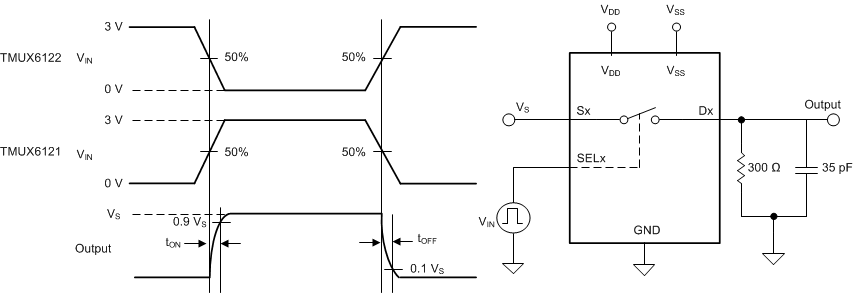SCDS398A December 2018 – July 2022 TMUX6121 , TMUX6122 , TMUX6123
PRODUCTION DATA
- 1 Features
- 2 Applications
- 3 Description
- 4 Revision History
- 5 Pin Configuration and Functions
-
6 Specifications
- 6.1 Absolute Maximum Ratings
- 6.2 ESD Ratings
- 6.3 Thermal Information
- 6.4 Recommended Operating Conditions
- 6.5 Electrical Characteristics (Dual Supplies: ±15 V)
- 6.6 Switching Characteristics (Dual Supplies: ±15 V)
- 6.7 Electrical Characteristics (Single Supply: 12 V)
- 6.8 Switching Characteristics (Single Supply: 12 V)
- Typical Characteristics
- 7 Parameter Measurement Information
- 8 Detailed Description
- 9 Application and Implementation
- 10Power Supply Recommendations
- 11Layout
- 12Device and Documentation Support
- 13Mechanical, Packaging, and Orderable Information
Package Options
Mechanical Data (Package|Pins)
- DGS|10
Thermal pad, mechanical data (Package|Pins)
Orderable Information
8.1.4 Turn-On and Turn-Off Time
Turn-on time is defined as the time taken by the output of the TMUX6121, TMUX6122, and TMUX6123 to rise to a 90% final value after the SELx signal has risen (for NO switches) or fallen (for NC switches) to a 50% final value. Figure 8-4 shows the setup used to measure turn-on time. Turn-on time is denoted by the symbol tON.
Turn off time is defined as the time taken by the output of the TMUX6121, TMUX6122, and TMUX6123 to fall to a 10% initial value after the SELx signal has fallen (for NO switches) or risen (for NC switches) to a 50% initial value. Figure 8-4 shows the setup used to measure turn-off time. Turn-off time is denoted by the symbol tOFF.
 Figure 8-4 Transition-Time Measurement Setup
Figure 8-4 Transition-Time Measurement Setup